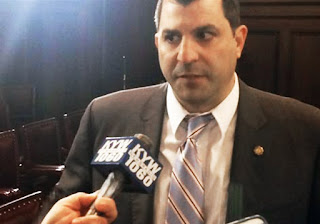 |
| Rep. Mark Rozz |
Pittsburgh Post-Gazette
June 12, 2018
Advocates for sexual-abuse survivors are rebooting their effort on Tuesday in Harrisburg for legislation that would allow victims to sue over abuse that happened years or decades ago.
And if a recent settlement in Minnesota is any indication, the implications for such legislation could be huge for Pennsylvania’s Roman Catholic dioceses, which are facing the imminent release of a landmark grand jury report into 70 years of alleged sexual abuse and cover-up.
The Archdiocese of St. Paul and Minneapolis on May 31 reached at $210 million settlement with about 450 victims of abuse by clergy and others associated with the church.
That followed the archdiocese’s 2015 bankruptcy filing, which itself followed an avalanche of lawsuits made possible by a 2013 Child Victim’s Act. That Minnesota law provided a three-year window in the statute of limitations that otherwise had barred lawsuits over long-ago abuse.
“There’s absolutely no doubt what we’re seeing in the Twin Cities is a direct result of the Child Victim’s Act,” said Terry McKiernan of BishopAccountability.org, a resource and victim’s advocacy group. He noted that other Minnesota dioceses are working on their own bankruptcy settlements.
He expects the pressure for a similar window would rise here “If the grand jury report really hits Pennsylvania hard, as I would expect it would.”
Advocates say victims take years, even decades, to come to terms with being sexually assaulted by clergy and others.
“What happened in Minnesota should be happening across the country,” said Robert Hoatson of the New Jersey-based Road to Recovery, an advocacy group for survivors of abuse. “There should be no statute of limitations on the sexual abuse of children.”
Pennsylvania currently has a strict statute of limitations, and those who have sued in past years have settled for relatively nominal amounts. The Diocese of Pittsburgh settled in 2007 for $1.25 million with 32 people whose attempt to pursue their lawsuits was stymied by court rulings that refused to consider their legal theory that the statute of limitations should be canceled in their cases because of alleged fraud and cover-up by the diocese.
Settlements with Pennsylvania’s victims of clergy abuse have mostly been small compared nine-figure settlements in Minnesota and earlier in California, which had also followed a window in the statute of limitations there.
Now, with the anticipated late-June release of a report into six more dioceses, Rep. Mark Rozzi is re-starting his effort.
Rep. Rozzi, D-Berks, himself a survivor of sexual abuse by a priest, said the issue involves more than one religious group.
“The problem is, this isn’t just a Catholic clergy problem,” he said in an interview in advance of this afternoon’s press conference at the Capitol rotunda in Harrisburg. “We still have people who were abused by (former Penn State assistant football coach) Jerry Sandusky who are looking for justice. We have Jehovah’s Witnesses that are looking for justice. We have Boy Scouts that are looking for justice.”
The news conference will include victims of abuse by Jehovah’s Witnesses who say their church covered up the risk of molesters within their ranks.
The Rev. Thomas Doyle, an expert in canon (Catholic Church) law, noted that the Twin Cities settlement came mainly from insurance, not church coffers.
He urged people not to be swayed by Catholic leaders’ arguments that bankruptcy settlements would drain needed funds from parishioners and schoolchildren who weren’t at fault for the misdeeds of past bishops. Rev. Doyle, a former advisor to bishops and long-time advocate for victims, gave expert testimony to the Pennsylvania grand jury and advised the attorney who handled the Minnesota settlement,
Just because people could file lawsuits, they still have to make their case, said Rev. Doyle, of Virginia. There would only be a massive settlement if there was massive abuse, which he suspects there was.
“The only reason the church is trying to stop it — they don’t care about people going to schools and parishes —they care about their reputation,” he said. “When you have a grand jury investigation with a damning report, it’s very difficult for the defense, the church to come up with any valid excuses why they acted the way they did.”
And, he noted, other victims of child-serving organizations face similar legal hurdles.
“It’s gross selfishness and self-centeredness for the institutional church because they think it’s all about them,” he said. “It’s about anybody that’s gone through that.”
In 2016, in the wake of a grand jury report into the history of abuse and cover-up in the Diocese of Altoona-Johnstown, an effort to open a window in the statute of limitations gained some momentum but faced a major lobbying counterpush from Catholic leaders.
While the Pennsylvania Catholic Conference, the voice of bishops on policy issues, opposed the earlier effort to lift the statute, spokeswoman Amy Hill declined to comment on this latest effort.
“In light of the upcoming grand jury report, we do not believe it’s appropriate at this time for us to discuss legislative issues,” Ms. Hill said.
The 40th statewide grand jury recently completed a 22-month term in Pittsburgh and reviewed half a million pages of internal documents from the dioceses of Pittsburgh, Greensburg, Erie, Harrisburg, Allentown and Scranton. The dioceses are reviewing for comment the 800-plus page report, which is expected to be released in late June.
Peter Smith: petersmith@post-gazette.com or 412-263-1416; Twitter @PG_PeterSmith.
http://www.post-gazette.com/news/faith-religion/2018/06/12/Massive-Minnesota-settlement-Catholic-sex-abuse-statute-of-limitations-grand-jury-dioceses/stories/201806120083

No comments:
Post a Comment